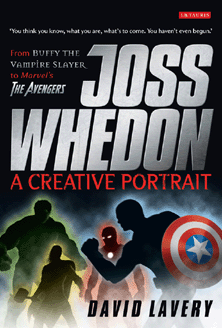The book begins with a lengthy prologue contrasting Whedon with his film school contemporary Michael Bay. Lambasting high budget, spectacle driven films like Armageddon and Transformers, it compares the two as “Caveman and Astronaut”. While this seems unfair, as Bay’s films have surely demonstrated their might with box office success, it sets the tone for a book which has little time for criticism as it tracks its subject from fan boy, though film studies to writer, script doctor and multi-million dollar movie director.
Offering a critical appraisal of Whedon’s style, Lavery makes repeated reference to the psychological writings of Howard Gruber who has studied the creative process. To be honest, we soon found the quotes that top each chapter impenetrable and began to skip them. Luckily, this had little impact on the story of Whedon’s career and early inspirations.

Beginning with family history, Lavery suggests the moment where the writer’s fan gene became active. His father, working on a comedy show, was allocated a pile of Spider-Man comics for reference material and dumped them in his son’s lap. Later, with an anglophile mother, and after a period of time living in Winchester, he drank in British influences such as Upstairs Downstairs, Monty Python and the BBC’s Shakespeare output.
After the failure of the initial Buffy the Vampire Slayer film, which Whedon wrote but did not direct, we follow him into the world of the Hollywood script process chronicling his input into movies such as Toy Story, Speed and Alien Resurrection. More fascinating is the talk of unproduced scripts and lesser known script doctoring on films like Waterworld and X-Men, from which it suggests only a single line of his signature dialogue remains.
In television, we hear of the genesis of the genre-defying Buffy TV series, its darker cousin Angel, the western-infused Firefly and the troubled Dollhouse. Whedon’s television CV is impressive and chapters deal with his various reversals of fortune.
Creating the highly successful Buffy from the ashes of a failed movie and later spinning Serenity out of the abortive small screen adventures of Firefly, the failures seem to tell the same story; Whedon is best left to fly unimpeded, surrounded by his trusted associates, while network or producer interference will ultimately cause things to fail.
Much is made of Whedon’s showrunning style. The discussion of the balance between a lead writer who writes it all verses a rewriter, who ensures a coherent vision and consistent character development, was fascinating. Unfortunately, the chapter ends by crediting Whedon with the genesis of many ideas and scenes, leaving us wondering what it was trying to prove? As instalments of a show with his name on the title, we suspected no less.
The final chapter endeavours to pin down what the book terms as ‘Whedonesque’ though examples but tends to feel like a final act of worship. Make no mistake, though sold off the back of The Avengers, this is fundamentally a Buffy lover’s book. At one point, Lavery even admits he believes Buffy “…will forever remain his finest achievement.” Given the imagination of Joss Whedon, we wouldn’t count on it!
![]()
Published by I.B.Tauris & Co Ltd.
What did you think of the book? Let us know below…

